Niger's Modern Economic & Geopolitical Journey (Part 3 of 3): Regional Instability & The Sahelian Confederacy
Another Tuareg Rebellion, Radical Extremism Issues, and a New Confederacy
This is the final part in our series on Niger.
Part 1 explored Niger’s pre-colonial history of its different tribes/empires, including the Tuareg Agadez Sultanate, Hausaland, Fulani Sokoto Caliphate, Songhai Empire, and Kanem-Bornu. We also discussed French Colonialism and why the country remains poor despite its vast uranium resources.
Part 2 delved into how successive Nigerien leaders focused on uranium resource nationalism over agriculture. This led to Niger improving when uranium prices were high, but declining when uranium prices were low. In addition, due to underinvestment in agriculture and irrigation systems, Niger suffered through drought, famine, and deforestation. Niger’s Songhai-ethnic, political elites isolated other tribes, especially the Tuareg Berbers, who felt culturally distinct from other Black Africans. The Tuareg tried rebelling but failed.
Today, we continue with Ibrahim Mainassara, who ousted the previous military leader, Mahamane Ousmane, and ended Songhai-Zarma dominance.
Niger has many problems (food insecurity, poor education, lack of manufacturing, energy issues, etc.), and inflation adjusted, the average Nigerien is poorer than they were at independence.

Ibrahim Bare Mainassara (1996-1999)
After Ibrahim's coup, Western aid to Niger was suspended. Without aid, Niger couldn’t pay civil servants and teachers, triggering massive strikes.
Six months after the coup, Ibrahim made an election and won, prompting the World Bank to resume aid and give economic advice to Niger.
The World Bank and IMF advised Mainassara to privatize some unprofitable state owned enterprises. However, other state-owned sectors like mining, oil, or electric utilities went untouched. Most of the investors who bought the unprofitable state owned firms were Mainassara’s friends; it wasn’t a competitive auction that the IMF envisioned.
Coup #3: In 1999, dissident soldiers killed Ibrahim in the capital airport, and then the commander of the presidential guard - Daouda Wanke took over.
Daouda Malam Wanke (1999)
Daouda promised and delivered a return to civilian rule in 1999, compelled by the suspension of international aid after his coup, and Niger desperately needed aid.
Mamadou Tandja (“Tawn-Jah”) (1999-2010)
In 1999, Niger elected their first Fulani President, who was served two terms until 2010, when he was ousted for attempting to extend his rule beyond constitutional limits.
During his 1st Term:
Mamadou borrowed from the IMF and implemented IMF austerity measures, leading to civil service and military budget cuts. In 2002, soldiers tried killing Mamadou for these cuts, but troops loyal to Mamadou stopped the mutiny.
He initiated the construction of a long-delayed hydroelectric dam, securing funding from the Islamic Development Bank in Saudi Arabia, the World Bank, and the West African Development Bank. He used these borrowed funds to pay Russian engineers to start building the Dam.
Mamadou signed a new mining law with the French firm Orano/Areva, granting tax breaks and audit exemptions in exchange for social investments in healthcare and schools.
After winning re-election, Tandja produced more results.
#1 Debt Relief: Tandja secured debt relief through the Heavily Indebted Poor Countries Initiative, reducing Niger's debt burden and freeing up funds for social spending. Niger’s debt was reduced from $2.15B to $760M.
#2 Commercial Gold Mining: Niger opened up a commercial gold mine in 2006 - the Samira Mine, with the government owning 20% and Moroccan & Canadian firms own 80%. This mine’s gold production helped Niger make gold surpass uranium in becoming Niger’s largest export by 2018.
#3 Uranium Resource Re-Negotiation:
Uranium’s price spiked again in the early 2000s, which is great for Niger. Uranium became a huge proportion of Niger’s foreign currency earnings again. By 2006, 55% of Niger’s foreign currency earnings was uranium.
Tandja negotiated a price premium over the spot price for Uranium, or else Tandja threatened going to other uranium mining firms for joint ownership for the new Imoraren mine. France’s Arera/Orano agreed to pay a premium, and as a result, Niger made a new government owned firm - Sopamin, which has joint ownership with France’s Areva and a South Korean firm in Imoraren.
Then Tandja signed a law requiring that these joint ventures must make a Nigerien on the board of directors. In addition, he increased the uranium royalty rates to between 12% to 15%.
But then Tandja courted other firms from other countries to mine uranium anyway. He partnered with China’s Sino-Uranium in the 4th uranium mine - Azelik and with Canadian firms for the 5th and 6th mines, which are still in progress.
Unfortunately, many issues still occurred in Tandja’s rule.
#1 Famine: In 2005, due to drought and crop losses from locusts from the previous year, nearly 2.5M Nigeriens were on the verge of starvation, which included 800K children. The UN tried bringing in food as fast as possible but many children died in the process. Tandja blamed the crisis on locust invasions, but the opposition party said the Tandja’s government was unconscionably taking food aid and selling it to neighboring countries at a higher price.
#2: Uranium prices plummeted in 2008. This happened for two reasons - firstly due to the Great Financial Crisis, prompting uranium mining firms to downsize, reducing demand. Additionally, increased uranium production in Namibia, Australia, and Kazakhstan post-2008 flooded the market, further suppressing prices. Despite time passing, uranium prices have yet to recover from their pre-crisis peak in June 2007, adversely affecting Niger which depended on high uranium prices for growth.
#3: The Second Tuareg Rebellion (2007-2009)
The Tuareg rebel group, Movement for Nigerien Justice (MNJ), said “Will no longer let Areva pillage our Country! We will no longer let Areva destroy our Environment!”
The Tuaregs kidnapped French and Chinese nuclear engineers halting Nigerien uranium production for a bit.
Tandja disregarded the Tuareg community's concerns, leading to feelings of marginalization and mistrust. The Tuaregs claim that Tandja didn’t see Tuaregs as “real Nigeriens” and said that Tandja wanted to genocide them. Despite peace accords following the first Tuareg rebellion in the 90s, integration efforts were inadequate, leaving many Tuaregs unemployed and disillusioned. They felt their indigenous rights were ignored, with uranium mining taking place in where they lived (uranium mining took place in Arlit and Akokan in the Agadez region, where the historical Tuareg Sultanate was located in), exacerbating their grievances. They didn’t feel like they benefited from the uranium. Frustrated by poor representation and perceived discrimination, some Tuaregs in Niger & Mali sought autonomy, sparking renewed tensions and attempts to secede.
Gaddafi of Libya negotiated a ceasefire between the Tuaregs and the Malian and Nigerien governments. Gaddafi promised investment in Tuareg areas.
Military coup #4: By 2009, Mamadou dissolved parliament as he tried to extend his past the two term limit. The African Union, European Union, and America condemned Mamadou’s attempt to extend his rule. The following year in 2010, a group of military leaders overthrew Mamadou. By the end of Mamadou’s term, he has been accused of stealing over $100M in foreign aid money.
Salou Djibo “Sah-Loo Jee-boh” (2010-2011)
Again, the military under Salou Djibo promised a return to civilian rule and allowed elections again to get aid. By 2011, new elections were held.
Mahamadou Issoufou “Ee-Soo-feu” (2011-2021)
Thanks to Mahamadou winning a peaceful election. Niger had access to foreign aid again.
Building a hydroelectric dam: The Russian firm, Zarubezhvodstroy, continued building the dam, and the dam has been delayed so many times that its crazy. The Dam was supposed to be done in 2013. It’s still not done yet… Niger switched contractors to China Gezhouba Group Company in 2018. The Dam was supposed to be done in 2025 but I’ll tell you why it was delayed later…
Oil: Around this time, Niger finally struck oil in the Agadem oilfield and built the Soraz oil refinery was made near Zinder. China’s China National petroleum Corporation (CNPC) helped extract the oil, and developed the pipeline through Benin. Niger crude oil production only started in 2012.
Renegotiated uranium mining deal with French Areva: The Japanese Fukushima accident led to countries like Germany, Austria, and Switzerland to decommission their nuclear power plants and a further decline in uranium prices. Since Issoufou knew he was going to receive less uranium export revenue, Issoufou renegotiated mining contracts, increasing Areva's taxes and made them invest €117M in infrastructure.
Inclusive government with the Tuaregs: Issoufou did not want issues with the Tuareg Berbers again, so Issoufou appointed a Tuareg leader from Agadez, Brigi Rafini as the Prime Minister. The inclusion of Tuareg leaders in the Nigerien government has pacified Tuareg Berber resistance.
Sahelian Africa Regional Instability:
After fanatic rebel groups lost the Algerian civil war in 2002, some of them decided to expand to weaker states under Algeria - like Chad, Mali, and Niger, rebranded as Al-Qaeda of the Islamic Maghreb or AQIM. All these countries joined George Bush’s “Global War on Terror”. But extremism still expanded; for example, AQIM abducted and killed two Frenchmen in Niamey in 2011.
Fanatical terror groups would get their “big break” after the Arab Spring, where mass protests against corruption took place across the Arab World. In Libya, Gaddafi decided to kill peaceful protesters, kickstarting the Libyan Civil War.
Gaddafi has always recruited and armed Tuareg militias in Libya, Niger, Mali, and Algeria. In return, the Tuareg would get decent paying jobs funded by Gaddafi’s oil wealth. They were part of Gaddafi’s Pan-African, Pan-Arab, Islamic Legion. In the Libyan war, Tuaregs were trying to protect Gaddafi.
Meanwhile, the United Nations authorized NATO and allied Middle Eastern countries to take all measures to protect Libyan civilians and install a no-fly zone. However, the UN intervention of Libya arguably went beyond the scope of protecting civilians, aided the rebels in killing Gaddafi, and ostensibly pursued regime change. Libya turned into a failed state afterwards.
The aftermath of Libya’s “revolution” meant that mercenaries and fanatical militants can steal Gaddafi’s weapon stockpiles and unleash mayhem into the weak governments Sahelian Africa.
The confluence of belligerent ISIS/Al-Qaeda affiliated radicals and ex-Gaddafi affiliated Tuareg Berber mercenaries who sought their own state teamed up to conquer Northern Mali in 2012, and renamed the state Azawad.
This scared the Nigerien government, thinking their state is next.
However, the extreme radicals betrayed the Tuaregs, and decided to expand the mayhem beyond Mali. France was able to help Mali retake the North from the extreme jihadists. But the extremist threat remains today as of 2024.
Niger requested help to deal with their extremism issue, and America has been a big supporter. Niger was the 2nd largest recipient of military aid in Sub-Saharan Africa. America lead bilateral development aid in Niger ($500M). In 2013, Niger allowed the military and CIA to set up a hundred million dollar drone base in Agadez, in central Niger with 1000 troops.
In 2014, France launched Operation Barkane, Mali, Niger, Chad, Mauritania and Burkina Faso teamed up to to remove the radical threat. It was called the G5 Sahel Group. Unfortunately, the French trained troops sometimes brutalized the local population as well, sowing the seeds of distrust of France and the West. Also, so many corrupt Nigerien government officials have stolen and sold off the arms Europeans provided Niger to outside foreigners. The joint group has collapsed between 2022-2023.
In addition, other militant groups in 2015, like Boko Haram, launched attacks on Southern Niger. Boko Haram, ISIS & Al Qaeda affiliated groups like GSIM or ISGS started more attacks like butchering hundreds of Nigerien villages and killing soldiers. This led to Nigeriens and other Sahelian Africans fleeing the region. Most Africans leave to other African countries, but some Africans flee to Europe. The EU made a deal with Mamadou: legislate & implement anti-migrant transport laws to curb migration from Niger to Europe in exchange for more aid (The EU’s $5.5B “Trust Fund for Africa”).
Ultimately Niger-Burkina Faso-Mali were in a quagmire, and the Sahel became France’s “Afghanistan issue”.
Mamadou peacefully handed over power in the next election.
Mohamed Bazoum is president (2021-2023)
Bazoum’s electoral victory was the first peaceful transfer of power between civilian governments. Before his political career, he served as a school teacher. Notably, Bazoum was Niger’s first African-Arab president, hailing from the Ouled Slimane Arab clan, which lives mainly in Southern Libya, Northern Chad, and Northeast Niger.
One could argue Bazoum was focusing more on development than security.
Focus on agriculture: America has provided $442M to help Niger develop sustainable irrigation projects.

European support: Bazoum has continued stopping Africans from trekking Niger’s desert to get to Europe in return for more financial & military aid.
Education: Bazoum was planning on building boarding schools for girls since female educational attendance is low in Niger. 77% of Nigerien girls are married before the age of 18 and there’s a high pervasiveness of polygamy.
Attempting Peace with Militants: Bazoum released militants as part of a ceasefire negotiation plan, exchanging peace for their release.
Security Issues:
In 2021, radical jihadists significantly increased their attacks in Niger, with villages burned, civil servants killed in landmines, and people murdered by mass shootings, particularly in southern Niger were Boko Haram has been active.
Despite the presence of American and French military forces, ongoing violence has led many Nigeriens to believe that these countries prioritize "neo-colonial interests" over their protection, resulting in Nigerien citizens calling for Western withdrawal.
Military coup #5: Bazoum was ousted over perceived corruption and being weak on security.
General Abdourahamane “Omar” Tchiani (2023-Present) “Ab-doo-rah-hah-mahn” “Chee-ah-nee”
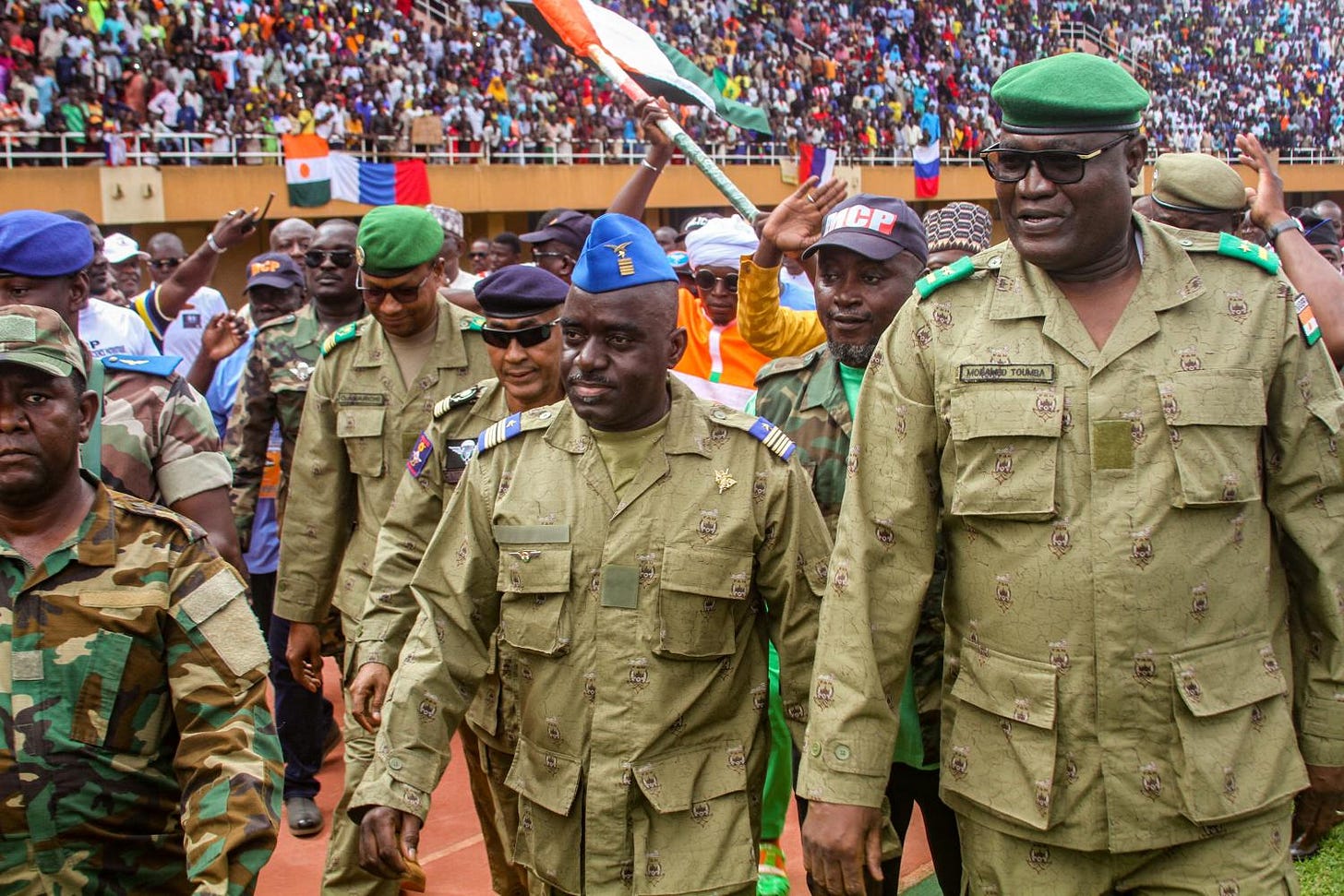
General Omar ousted Bazoum due to perceived incompetence in combating extremists, citing Bazoum’s release of extremist fighters from prison and inadequate coordination with neighbors like Burkina Faso and Mali. Months before the coup, Nigerien soldiers where still dying from landmines and civilians were being killed.
Omar has ruled since 2023 but many events have already transpired.
#1 Issues with the Economic Community of West African States (ECOWAS):
ECOWAS suspended Guinea, Mali, Niger, and Burkina Faso following military coups, cutting off trade and imposing sanctions. Nigeria also halted power supply to Niger, causing blackouts, as Niger’s state owned supplier - Nigelec - relies on Nigeria for 70% of its electricity. Nigeria also threatened invading Niger, but backed off. France, the EU, and the US slashed economic aid to Niger, resulting in a significant drop in government revenue, as Niger’s $2B in foreign aid makes up 40% of Niger's budget.
But, February 2024, ECOWAS lifted sanctions on Niger, allowing for the resumption of trade, electricity, unfrozen assets, and aid. Why? They didn’t view war was worth it. With the lifting of sanctions, Niger can now export crude oil, potentially leading to double-digit GDP growth if oil prices remain high above $85 per barrel.
#2 Oil Pipeline via Benin:
China National Petroleum Corporation (CNPC) pipeline came online in 2023, and Niger expects the pipeline to generate significant government revenue and foreign exchange via oil exports. The pipeline goes through Benin, allowing Niger to make money through exporting crude, Benin collects government revenue via transit fees, and gives China another country to get crude oil from. In 2023, the the oil output was 20K barrels per day, (which is very small, less than Cuba or Belarus). In 2024, Omar hopes to increase oil output to 110K barrels a day which would bring Niger to the output of the petrostate Brunei. By 2026, due to British and Algerian firms looking for more oil, Niger wants to produce 200K barrels of oil a day (more than Bahrain). This would make Niger’s main source of government revenue come from oil instead of uranium or gold.
Unfortunately, due to diplomatic disputes with Benin after Niger’s coup, Niger can’t export oil. Patrice Talon of Benin has made Niger’s oil exports conditional on Niger reopening its border.
#3 The Alliance of Sahelian States.
Another reason why ECOWAS didn’t invade Niger was because Niger-Mali-Burkina Faso have now formed the Alliance of Sahelian States, a security, monetary, and political union. This alliance could be more feasible, if they weren’t landlocked. Uniting with Guinea, another military dictatorship that neighbors them would help them. Coastal transport is an important aspect to trade, or else they will pay high fees using Ivorian, Togolese, Ghanaian, Beninese, or Nigerian ports.
#4 Building a hydroelectric dam: Remember this game changing hydroelectric and irrigation Dam project I told you about? China’s Gezhouba Group, which was building the dam, announced that it had suspended all construction activities due to the economic sanctions imposed by ECOWAS after the coup. This project which would have finally brought more electricity and irrigation has been delayed again past 2025.
#5 Breaking off from the West: Niger kicked out the EU and ended the military deal with US. This is Biden’s second massive scale down since the withdrawal from Afghanistan. France is also now pulling out its 1500 French troops. Omar also over-turned anti-migration law, which means Niger will no longer deter Nigeriens migrating to Europe just to get more economic aid. Omar then revoked the mining license of Orano and gave it a Russian firm. Lastly, Niger has now signed a security deal with Russia.
Turkey: Omar has also secured security agreements with Turkey, which include the deployment of Syrian mercenaries from Turkish-occupied northern Syria. These mercenaries guard gold & uranium mines and combat radical militants.
Missed Debt Payment: In February 2024, due to post-coup sanctions, Niger defaulted on a $24M debt payment, adding to its $600M loan default since the coup. Now Niger has a default credit rating and very few investors for the time being want to extend a loan to Niger.
Conclusion
The United Nations backed intervention in Libya, killed Gaddafi and created instability in Sahelian Africa, including Niger. This allowed transnational & local extremists to ruin Niger and its neighbors, contributing to Europe’s African migrant crisis.
To the current military regime of Niger, they see the West has the cause of instability, not a promoter of stability. This is why Niger, Mali, and Burkina Faso have kicked out France & America and have asked for Russian support.
However, the effectiveness of Russian support remains uncertain, as demonstrated by Russia’s failure to stop ongoing conflicts in countries like the Central African Republic (approaching its 12th year of its civil war) and Mozambique (where Mozambique kicked out Russia’s mercenary group for failing to remove the extremists in the gas-rich, Cabo Delgado province).
Niger has formed an alliance with Mali and Burkina Faso. However, these states barely trade with one another (All three of them mainly sell gold to UAE) and have a massive gold smuggling issue (especially Mali). They all don’t make much in intermediate or manufactured goods, are landlocked, have a militant extremist problem, have poorly educated populaces, can’t feed themselves, and struggle to keep the lights on. Lastly, all three of them have a Tuareg minority. If these countries can’t make their Tuareg minority feel included in the state, then it is possible that Tuareg rebels in these countries could coordinate to destabilize these countries. Good luck to them.






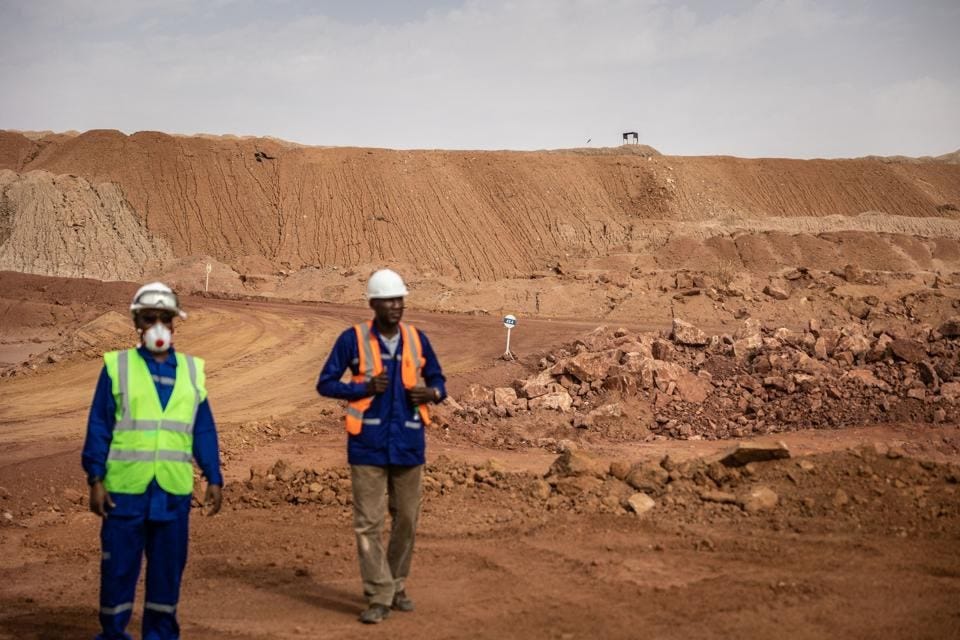

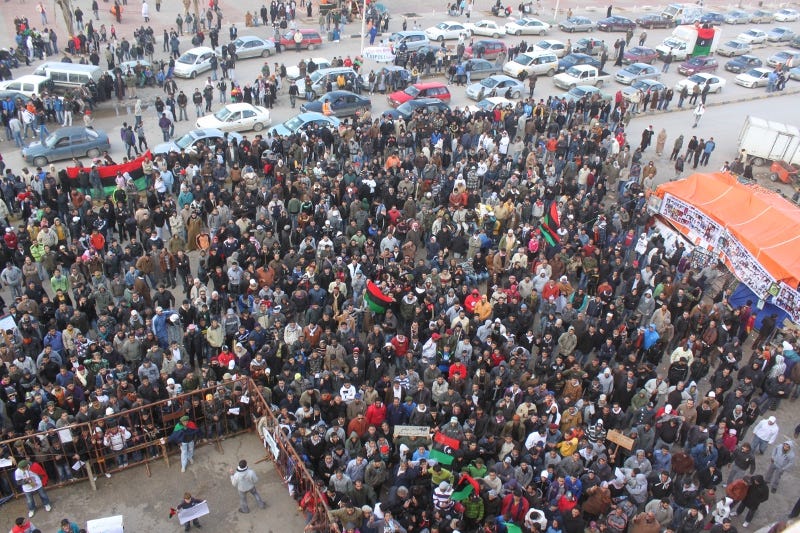
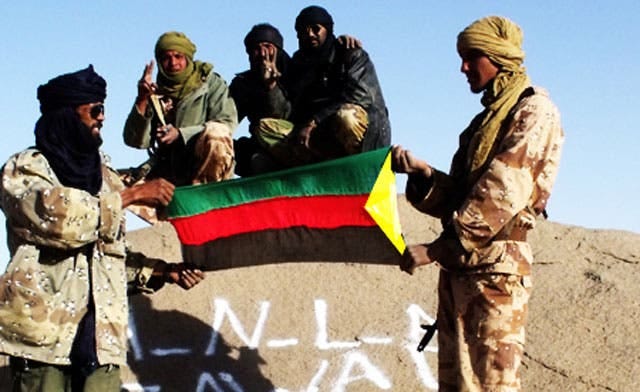
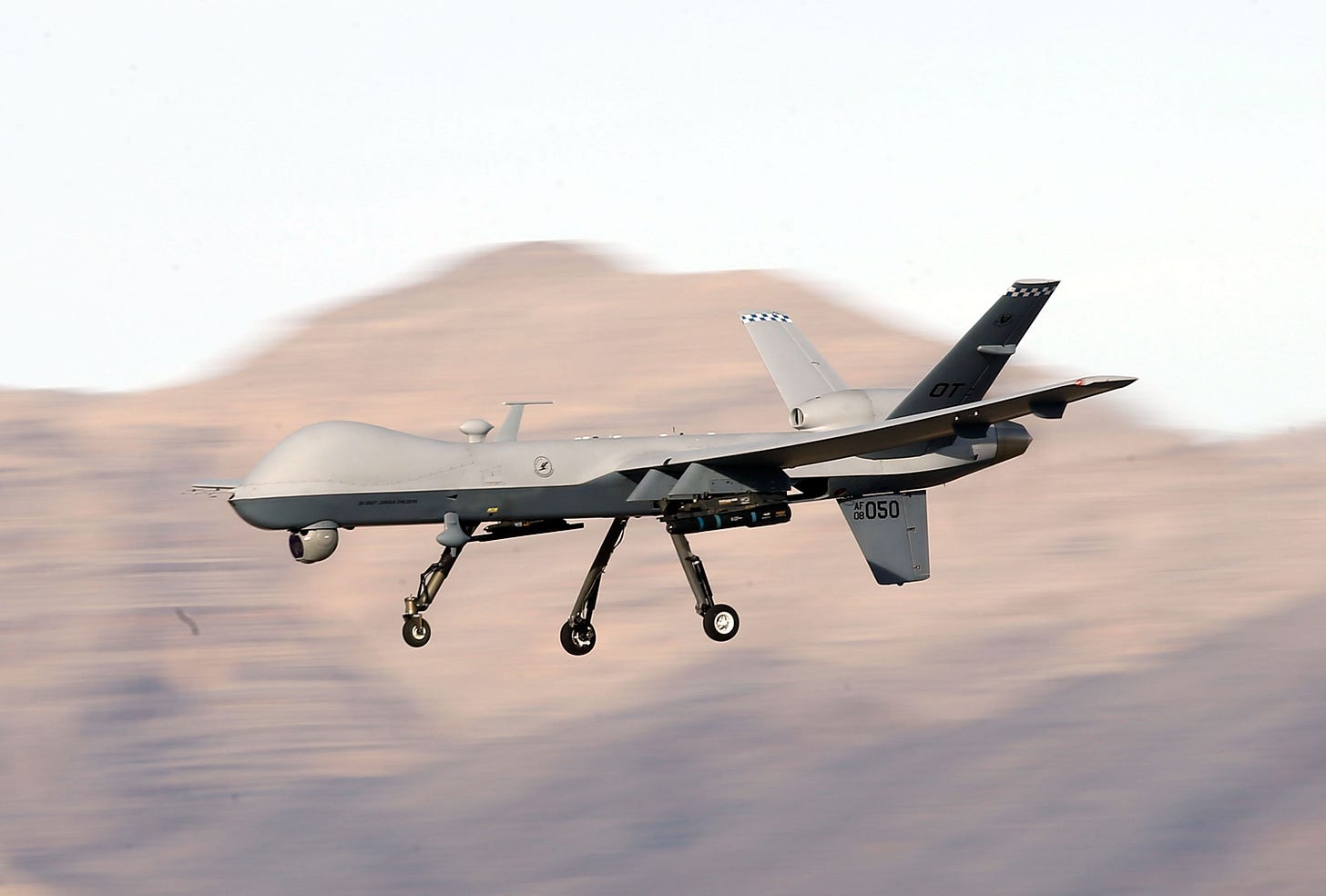

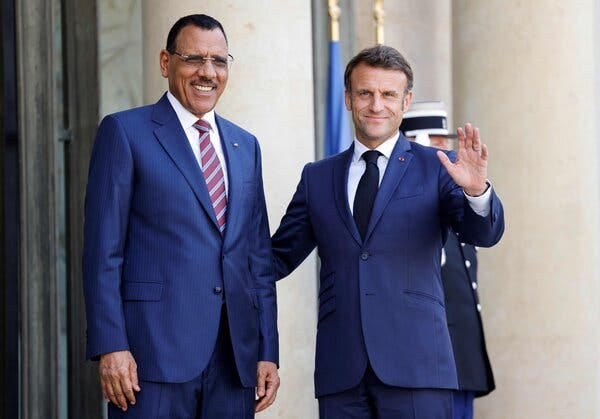
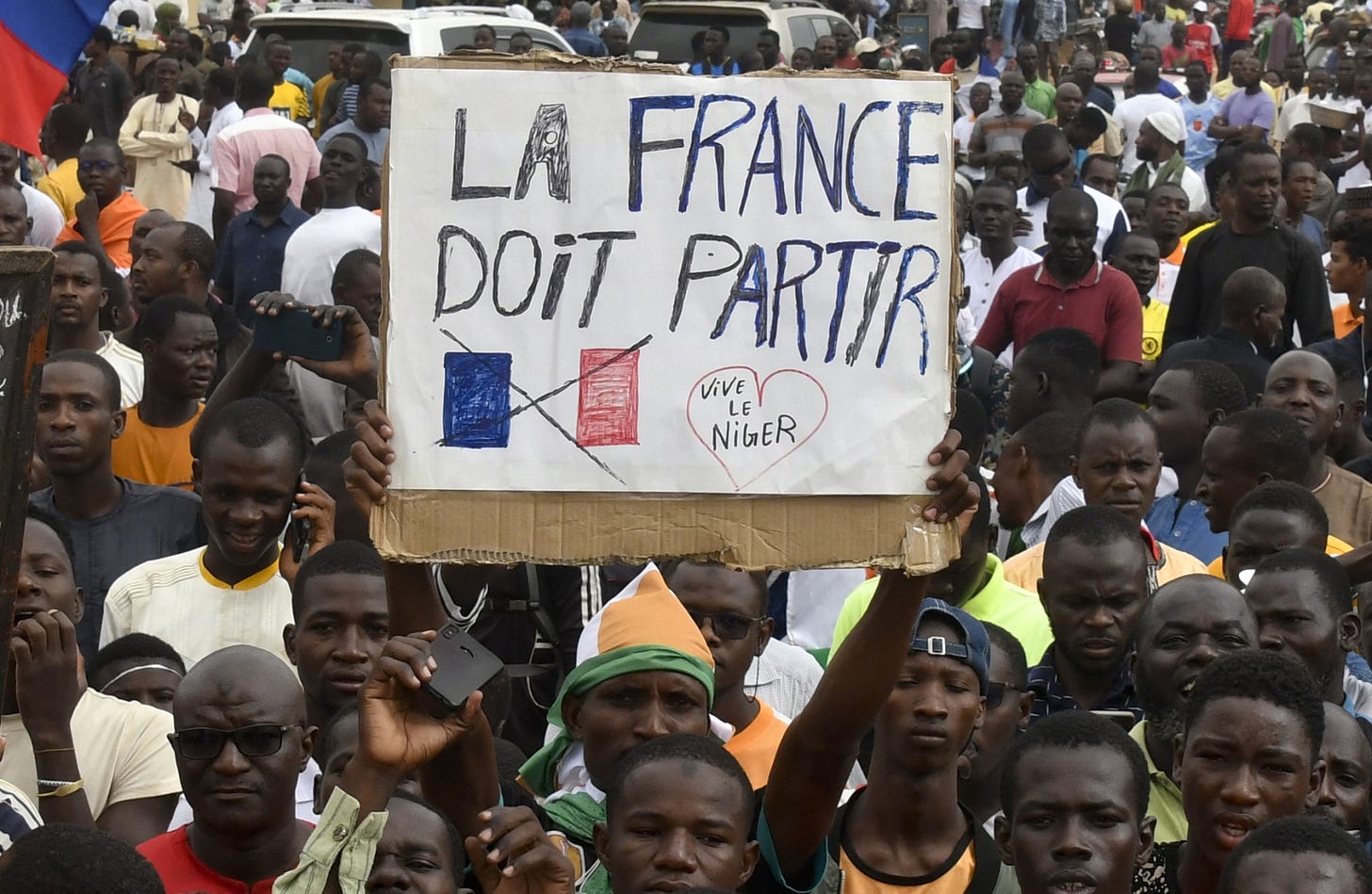



Given how unstable this region is you believe that Niger would be able to make much money from oil in the end. Giant pipelines make for easy targets.
Is there any country in the world that has effectively passified its nomadic population without mass genocide or something? Can you give them free land to encourage them to become a sedentary farming population that will respect property rights?